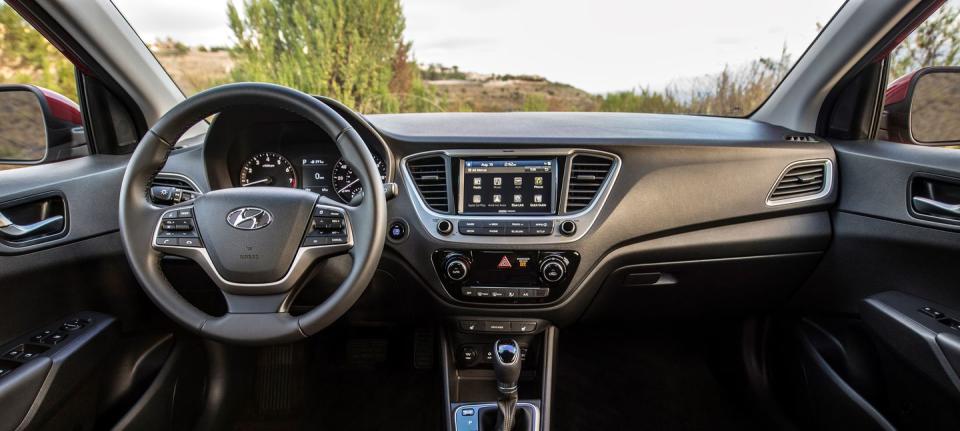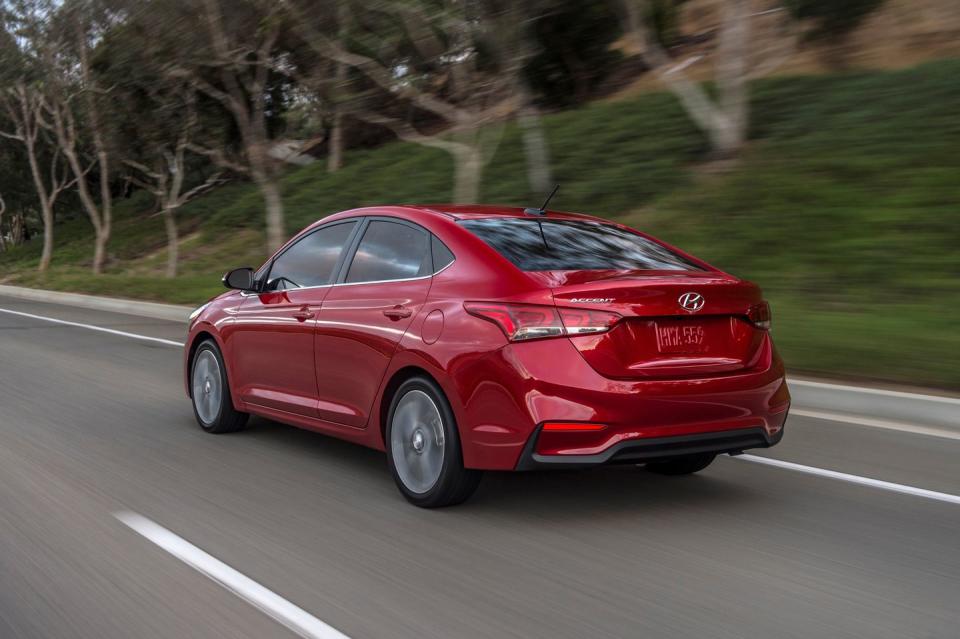2020 Hyundai Accent Sedan Gets Powertrain and MPG Improvements

The 2020 Hyundai Accent improves on the all-new 2018 model with a significantly revised engine and a new transmission.
Yet the price only increases by $200 to $300 over the 2019 Accent.
Fuel economy is the 2020 model's strong suit: a combined 36 mpg for the model with CVT and 33 mpg on the manual-transmission model.
As an all-new 2018 model, the Hyundai Accent earned a reputation among the Car and Driver staff for providing thrifty yet not entirely dull transportation without feeling overtly cheap, particularly when it is equipped with the six-speed manual transmission. Now Hyundai is doubling down on the efficiency part of the equation with the 2020 Accent, introducing a significantly revised version of the 1.6-liter four-cylinder engine and a new continuously variable automatic transmission for even better fuel economy.
Trim levels and standard content, including air conditioning, a 5.0-inch touchscreen infotainment system, remote keyless entry, and power windows, mirrors, and locks, remain unshuffled for 2020. The Accent is again available in SE manual, SE, SEL, and Limited trims. Despite the significant influx of engine and transmission technology for the 2020 model year, it's nice to see Hyundai kept the price creep to a minimum:
2020
2019
SE with six-speed manual
$16,125
$15,925
SE CVT
$17,225
$16,925
SEL CVT
$18,480
$18,275
Limited CVT
$20,230
$20,010

Engine Improvements
Hyundai has coined the term Smartstream as a blanket name for the Accent's new powertrain. The 1.6-liter inline-four engine makes 120 horsepower at 6500 rpm and 133 lb-ft of torque. That's 10 horsepower and 14 lb-ft shy of the 2019 model's engine. The Accent now features dual port injection, a new thermal management module, continuously variable valve timing, a high-energy ignition coil, a narrow water-jacket core in the block, and a external EGR valve.
While the previous engine employed direct injection, the new G1.6 engine uses port injection with two injectors per cylinder. It's teamed with Hyundai's continuously variable valve timing to improve efficiency and reduce emissions. The thermal management module replaces a traditional single-unit thermostat and instead modulates the temperature of the radiator, transmission fluid cooler, and heater at their individual ports. The narrow water jacket core adds additional thermal efficiency, while the new ignition coil and EGR valve are both designed to improve combustion stability, which in turn promises improved fuel economy.
New CVT Is More Fuel Efficient
Although the six-speed manual transmission is still available (hooray!), it’s the new CVT that is getting all the headlines. (Hyundai is calling the new CVT an IVT, which stands for Intelligent Variable Transmission.) Hyundai says that in addition to providing superior efficiency, it does a better job of simulating shifts by constantly modulating the pressure of the transmission's pulley based on driving conditions and driver input. Utilizing a wide-ratio pulley system, it is also said to provide a broader range of operation compared with its competitors, as well as improved low-speed performance and improved fuel economy at higher speeds.
Hyundai’s new CVT provides superior efficiency and simulates gearshifts, thanks in part to Hyundai’s new Shift Control Strategy that improves linearity between driver inputs, vehicle behavior, and acceleration. It utilizes a wide-ratio pulley system, which provides a broader ratio of operation when compared with its competitors. This allows for improved fuel economy at higher gear ratios and improved performance at lower ratios. Hyundai says the system offers enhanced shift response and that it results in shifts that closely replicate those of a standard automatic. Additional efficiency gains around 1 percent are provided by the use of a chain belt in place of a common push belt.

EPA estimated fuel economy for the 2020 Accent with the CVT is 33 mpg city, 41 mpg highway, and 36 mpg combined. That's 5 mpg more in the city, 3 mpg better on the highway, and a 4-mpg improvement over the combined rating for the 2019 Accent. Drivers who wish to shift for themselves will also see an improvement. The 2020 Accent with the six-speed manual transmission returns 29 mpg city, 39 mpg highway, and 33 mpg combined, improvements of 2 mpg across all three metrics.
('You Might Also Like',)

